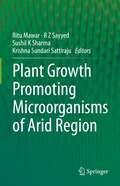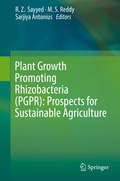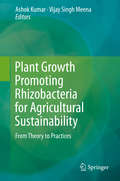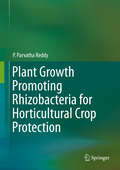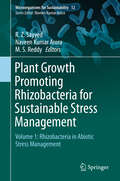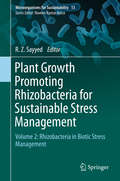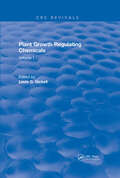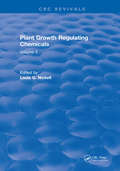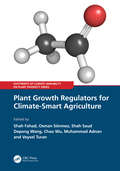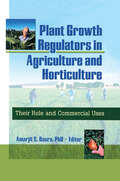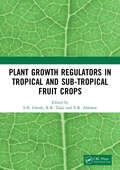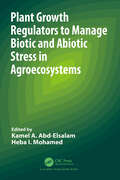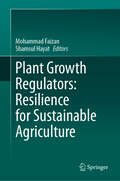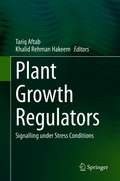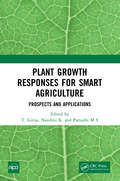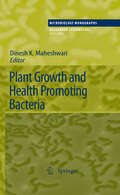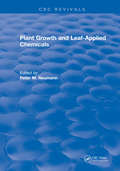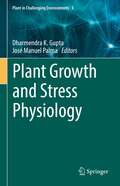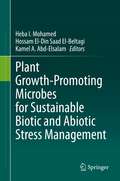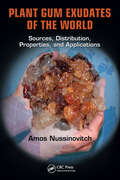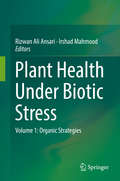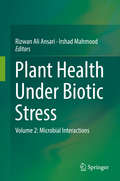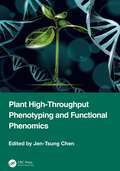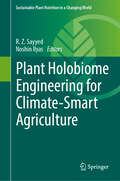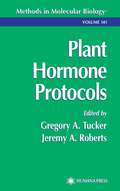- Table View
- List View
Plant Growth Promoting Microorganisms of Arid Region
by Ritu Mawar R Z Sayyed Sushil K Sharma Krishna Sundari SattirajuThis edited book aims to focus on microbial diversity in arid lands and deserts versus specific microbial assemblages associated with plants. The book explains ecological drivers that shape this diversity, how plant-associated microbiomes are selected, and their biotechnological potential are discussed. Diversity and functional redundancy of these associated PGPM make them very active in supporting plant improvement, health and resistance to drought, salt and other stresses, and these dimensions will be explored in this book. Implementing proper biotechnological applications of the arid and desert-adapted PGPM constitutes a sizeable challenge, and the book attempts to take up that challenge and help researchers in this field to gain a detailed understanding of PGPM from arid ecosystems. This book serves as a handbook for research workers, teachers, postgraduate students and extension personnel, other development workers, and policy planners engaged in arid zone development.
Plant Growth Promoting Rhizobacteria (PGPR): Prospects for Sustainable Agriculture
by M. S. Reddy R. Z. Sayyed Sarjiya AntoniusSustainable increase in agricultural production while keeping the environmental quality, agro-ecosystem function and biodiversity is a real challenge in current agricultural practices. Application of PGPR can help in meeting the expected demand for increasing agricultural productivity to feed the world’s booming population. Global concern over the demerits of chemicals in agriculture has diverted the attention of researchers towards sustainable agriculture by utilizing the potential of Plant Growth Promoting Rhizobacteria (PGPR). Use of PGPR as biofertilizers, biopesticides, soil, and plant health managers has gained considerable agricultural and commercial significance. The book Plant Growth Promoting Rhizobacteria (PGPR): Prospects for Sustainable Agriculture has contributions in the form of book chapter from 25 eminent global researchers, that discusses about the PGPRs and their role in growth promotion of various crop plants, suppression of wide range of phytopathogens, their formulation, effect of various factors on growth and performance of PGPR, assessment of diversity of PGPR through microsatellites and role of PGPR in mitigating biotic and abiotic stress.This book will be helpful for students, teachers, researchers, and entrepreneurs involved in PGPR and allied fields. The book will be highly useful to researchers, teachers, students, entrepreneurs, and policymakers.
Plant Growth Promoting Rhizobacteria for Agricultural Sustainability: From Theory to Practices
by Ashok Kumar Vijay Singh MeenaTo meet the food security needs of the 21st century, this book focuses on ecofriendly and sustainable production technologies based on plant growth promoting rhizobacteria (PGPR). It is estimated that the global population could increase to 9 billion by 2050. Further, the amount of land devoted to farming has decreased. Soil is a living entity, and is not only a valuable natural resource for agricultural and food security, but also for the preservation of all life processes. Agricultural productivity rests on the foundation of microbial diversity in the soil, and in recent years, PGPR have emerged as an important and promising tool for sustainable agriculture.The injudicious use of agrochemicals by farmers has created a range of negative impacts, not only threatening the environment, but also destroying useful microorganisms in the soil. The efficient use of PGPR reduces the need for these chemicals while simultaneously lowering production costs. In turn, increased yields could provide a more favourable environment and encourage sustainability. This book assesses the impacts of PGPR on crops, environmental and socio-economic sustainability, and demonstrates these ecofriendly technologies’ three critical advantages, namely (a) enhanced crop productivity, (b) reduced application of agrochemicals, and (c) increased incomes for farmers. Besides offering an economically attractive and ecologically sound means of augmenting the nutrient supply and combatting soil-borne pathogens, PGPR play an important part in boosting soil fertility, bioremediation and stress management for the development of ecofriendly and sustainable agriculture.
Plant Growth Promoting Rhizobacteria for Horticultural Crop Protection
by P. Parvatha ReddyThe use of synthetic pesticides has undoubtedly resulted in the achievement of increased crop production. However, in recent times, there has been a considerable pressure on consumers and farmers to reduce or eliminate the use of synthetic pesticides in horticulture, since fruits and vegetables are consumed afresh. This concern has encouraged looking for better alternatives which are cheaper and eco-friendly than synthetic pesticides. It is well known that plant growth promoting rhizobacteria (PGPR) play an important role in maintaining crop and soil health through versatile mechanisms. There are two main outcomes or effects from beneficial microorganisms: enhanced plant growth and crop protection, both of which represent the two main constraints to agriculture. The information on biomanagement of pests (insect and nematode pests, fungal, bacterial and viral/phytoplasma diseases) of horticultural crops (fruits, vegetables, plantation, spice, tuber, ornamental, medicinal and aromatic crops) using PGPR is very much scattered. There is no book at present which comprehensively and exclusively deals with the above aspects on horticultural crops. The present book deals with biomanagement of pests in horticultural crops in detail using PGPR. The present book deals with biomanagement of pests in horticultural crops in detail using PGPR. The present book is divided into six sections. The first section deals with the importance of PGPR including introduction, potential role of PGPR in agriculture, genera of PGPR, disease management, nematode management, insect pest management, integrated pest management, mechanism of biocontrol, mass production, formulation, delivery and commercialization. Pest management in tropical, sub-tropical and temperate fruit crops is dealt in Section II. The third section deals with pest management in Solanaceous, bulbous, Malvaceous, Cruciferous, Leguminous, Cucurbitaceous, leafy and root and tuber vegetable crops. Pest management in plantation and spice crops is in Section IV. Section V deals with pest management in ornamental, medicinal and aromatic crops. The last section deals with a road map ahead including challenges, future prospective and conclusions. The book is extensively illustrated with excellent quality photographs enhancing the quality of publication. The book is written in lucid style, easy to understand language along with adoptable recommendations involving eco-friendly components of IPM.
Plant Growth Promoting Rhizobacteria for Sustainable Stress Management: Volume 1: Rhizobacteria in Abiotic Stress Management (Microorganisms for Sustainability #12)
by Naveen Kumar Arora M. S. Reddy R. Z. SayyedIncreasing agro productivity to feed a growing global population under the present climate scenario requires optimizing the use of resources and adopting sustainable agricultural production. This can be achieved by using plant beneficial bacteria, i.e., those bacteria that enhance plant growth under abiotic stress conditions, and more specifically, microorganisms such as plant growth promoting rhizobacteria (PGPR), which are the most promising candidates in this regard. Attaining sustainable agricultural production while preserving environmental quality, agro-ecosystem functions and biodiversity represents a major challenge for current agricultural practices; further, the traditional use of chemical inputs (fertilizers, pesticides, nutrients etc.) poses serious threats to crop productivity, soil fertility and the nutritional value of farm produce. Given these risks, managing pests and diseases, maintaining agro-ecosystem health, and avoiding health issues for humans and animals have now become key priorities. The use of PGPR as biofertilizers, plant growth promoters, biopesticides, and soil and plant health managers has attracted considerable attention among researchers, agriculturists, farmers, policymakers and consumers alike. Using PGPR can help meet the expected demand for global agricultural productivity to feed the world’s booming population, which is predicted to reach roughly 9 billion by 2050. However, to do so, PGPR strains must be safe for the environment, offer considerable plant growth promotion and biocontrol potential, be compatible with useful soil rhizobacteria, and be able to withstand various biotic and abiotic stresses. Accordingly, the book also highlights the need for better strains of PGPR to complement increasing agro-productivity.
Plant Growth Promoting Rhizobacteria for Sustainable Stress Management: Volume 2: Rhizobacteria in Biotic Stress Management (Microorganisms for Sustainability #13)
by R. Z. SayyedAttaining sustainable agricultural production while preserving environmental quality, agro-ecosystem functions and biodiversity represents a major challenge for current agricultural practices; further, the traditional use of chemical inputs (fertilizers, pesticides, nutrients etc.) poses serious threats to crop productivity, soil fertility and the nutritional value of farm produce. Given these risks, managing pests and diseases, maintaining agro-ecosystem health, and avoiding health issues for humans and animals have now become key priorities. The use of PGPR as biofertilizers, plant growth promoters, biopesticides, and soil and plant health managers has attracted considerable attention among researchers, agriculturists, farmers, policymakers and consumers alike. Using PGPR as bioinoculants can help meet the expected demand for global agricultural productivity to feed the world’s booming population, which is predicted to reach roughly 9 billion by 2050. However, to provide effective bioinoculants, PGPR strains must be safe for the environment, offer considerable plant growth promotion and biocontrol potential, be compatible with useful soil rhizobacteria, and be able to withstand various biotic and abiotic stresses. Accordingly, the book also highlights the need for better strains of PGPR to complement increasing agro-productivity.
Plant Growth Regulating Chemicals: Volume I
by Louis G. NickellThe purpose of this two-volume work is to make available both to the investigator and user, on a crop by crop basis, the latest information on the use of chemicals to regulate plant growth and development. Emphasis is given to the major crops and to those which the most success has been achieved.
Plant Growth Regulating Chemicals: Volume II
by Louis G. NickellThe purpose of this two-volume work is to make available both to the investigator and user, on a crop by crop basis, the latest information on the use of chemicals to regulate plant growth and development. Emphasis is given to the major crops and to those which the most success has been achieved.
Plant Growth Regulators for Climate-Smart Agriculture (Footprints of Climate Variability on Plant Diversity)
by Shah FahadClimatic conditions are key determinants of plant growth, whether at the scale of temperature regulation of the cell cycle or at the scale of the geographic limits for a particular species. The climate is changing due to human activities – particularly the emission of greenhouse gases – therefore the conditions for the establishment, growth, reproduction, survival, and distribution of plant species are changing. In contrast to animals, plants are able to cease and resume growth. This flexibility in their architecture and growth pattern is partly achieved by the action of plant hormones. Still, the role of plant growth regulators (PGRs) in agriculture is modest compared to other agrochemicals, such as fungicides, herbicides, and insecticides. Plant Growth Regulators for Climate-Smart Agriculture is an invaluable guide to the varied roles filled by PGRs in the attainment of higher-quality, better-yielding crops. Salient Features (minimum 5): Explores plant growth regulators and anthropogenic climate change. Provides new insights related to hormonal cross-talk in plant development and stress responses. Sheds new light on the role of PGRs in agriculture in the attainment of higher-quality, better-yielding crops. Delivers valuable information on physiological and molecular mechanisms linked to the role of plant growth regulators in stress tolerance. Provides valuable knowledge for students of agronomy, plant physiology, molecular biology, and environmental sciences.
Plant Growth Regulators in Agriculture and Horticulture: Their Role and Commercial Uses
by Amarjit BasraAs agriculture becomes more mechanized and science increases the possibilities for using inputs to enhance production, the role of PGRs becomes more vital. Plant Growth Regulators in Agriculture and Horticulture provides agriculture professionals and researchers with the information needed to effectively tap these versatile resources to enhance crop production.Through discussions of the “classical five” phytohormones--gibberellins, cytokinins, ethylene, abscisic acid, and auxins--and the growing number of nontraditional PGRs such as oligosaccharins and brassinosteroids, Plant Growth Regulators in Agriculture and Horticulture reviews past and present uses of PGRs in managing crop yield and offers some speculation on future directions.Detailed discussions on the use of PGRs in, for example, grain, ornamental, and citrus crops, introduce readers to strategies for enhancing crop quantity and quality, for improving the postproduction quality of life of perishable plants, and for crop load management, respectively. The book also includes informative visuals, such as tables of common, chemical, and trade names of different commercially available PGRs; diagrams of various PGR processes; as well as before-and-after pictures illustrating the effects of PGRs.Plant Growth Regulators in Agriculture and Horticulture is a comprehensive text covering the role of plant growth regulators in: root formation manipulating yield potential plant stress protection ornamental horticulture postharvest life of ornamentals manipulating fruit development and storage quality citriculture reducing fruit drop bloom-thinning strategiesIf the history of agriculture, which is over 10,000 years old, was condensed into a twenty-four-hour span, science-based plant breeding would be only about fifteen minutes old. Still, the role of PGRs in agriculture is modest compared to other agrochemicals, such as fungicides, herbicides, and insecticides. Plant Growth Regulators in Agriculture and Horticulture is an invaluable guide to the varied roles filled by PGRs in the attainment of higher-quality, better-yielding crops.
Plant Growth Regulators in Tropical and Sub-tropical Fruit Crops
by Prof. Dr. S. N. GhoshPlant growth regulators or plant bio-regulators have emerged as a powerful tool for improving the performance of horticultural crops in general and fruit crops in particular. This book provided recent information on role of plant hormones, how their concentrations are regulated, and how they modulate the various plant processes. ‘Plant Growth Regulators in Tropical, Sub-tropical Fruit Crops’ is a comprehensive book covering function of plant growth regulators in propagation including micro-propagation, growth, flowering and fruiting behaviour, yield, quality, shelf life and stress management etc. This book has 26 chapters covering most of the tropical and sub-tropical fruit crops like aonla, avocado, banana, ber, citrus, custard apple, date palm, fig, grape, guava, jamun, kokam, litchi, mango, mulberry, papaya, passion fruit, sapota, phalsa, pomegranate and strawberry. Note: T&F does not sell or distribute the Hardback in India, Pakistan, Nepal, Bhutan, Bangladesh and Sri Lanka.
Plant Growth Regulators to Manage Biotic and Abiotic Stress in Agroecosystems
by Kamel A. Abd-Elsalam Heba I. MohamedPlant Growth Regulators to Manage Biotic and Abiotic Stress in Agroecosystems is a comprehensive book that explores the use of plant growth regulators (PGRs) as effective stress-reduction techniques in agricultural environments. This book investigates the role of PGRs in handling biotic and abiotic stressors, offering useful insights to agriculturalists, researchers, and students. The book provides a comprehensive overview of many PGRs, including their methods of action and impacts on plant growth and development. It describes the use of PGRs to treat plant diseases caused by pathogens such as fungi, bacteria, and viruses. The book also discusses the application of PGRs to improve plant tolerance to adverse climatic circumstances including drought, salt, and extreme temperatures. The authors also underline PGRs' sustainable and environmentally friendly character, which makes them a potential option for chemical therapies. They explore PGRs' potential to improve agricultural yield and resilience, therefore helping food security in a rapidly changing global environment. This book is an excellent resource for learning about the applications and advantages of PGRs in modern agriculture.
Plant Growth Regulators: Resilience for Sustainable Agriculture
by Shamsul Hayat Mohammad FaizanThis edited book focuses on plant growth regulator synthesis, potential applications, stress tolerance mechanisms and preservations. It explores the recently registered molecules strigolactones, karrikins, and hemin-mediated regulation of plant biology. Chapters cover the integration of plant hormones in the biological system as an opportunity for sustainable agriculture. This book explores the latest information on plant growth regulators covering both theoretical and practical aspects. Plant growth regulators are organic chemical compounds that alter or regulate the metabolism in plants. In plants, plant growth regulators play the role of biostimulants that can enhance resistance to stress. Plant growth regulators in low concentrations often lead to vital improvements and high yields in crop plants. Plant growth regulators are involved in several physiological, morphological, and biochemical mechanisms associated with plant growth, development and defence againststresses. This book brings together the latest research work on plant growth regulators and their emerging importance. The book is a useful read for students, researchers, and instructors in the field of plant biology.
Plant Growth Regulators: Signalling under Stress Conditions
by Khalid Rehman Hakeem Tariq AftabAgriculture faces many challenges to fulfil the growing demand for sustainable food production and ensure high-quality nutrition for a rapidly growing population. To guarantee adequate food production, it is necessary to increase the yield per area of arable land. A method for achieving this goal has been the application of growth regulators to modulate plant growth. Plant growth regulators (PGRs) are substances in specific formulations which, when applied to plants or seeds, have the capacity to promote, inhibit, or modify physiological traits, development and/or stress responses. They maintain proper balance between source and sink for enhancing crop yield. PGRs are used to maximize productivity and quality, improve consistency in production, and overcome genetic and abiotic limitations to plant productivity. Suitable PGRs include hormones such as cytokinins and auxins, and hormone-like compounds such as mepiquat chloride and paclobutrazol. The use of PGRs in mainstream agriculture has steadily increased within the last 20 years as their benefits have become better understood by growers. Unfortunately, the growth of the PGR market may be constrained by a lack of innovation at a time when an increase in demand for new products will require steady innovation and discovery of novel, cost-competitive, specific, and effective PGRs.A plant bio-stimulant is any substance or microorganism applied to plants with the aim to enhance nutrition efficiency, abiotic stress tolerance and/or crop quality traits, regardless of its nutrients content. Apart from traditional PGRs, which are mostly plant hormones, there are a number of substances/molecules such as nitric oxide, methyl jasmonate, brassinosteroids, seaweed extracts, strigolactones, plant growth promoting rhizobacteria etc. which act as PGRs. These novel PGRs or bio-stimulants have been reported to play important roles in stress responses and adaptation. They can protect plants against various stresses, including water deficit, chilling and high temperatures, salinity and flooding. This book includes chapters ranging from sensing and signalling in plants to translational research. In addition, the cross-talk operative in plants in response to varied signals of biotic and abiotic nature is also presented. Ultimately the objective of this book is to present the current scenario and the future plan of action for the management of stresses through traditional as well as novel PGRs. We believe that this book will initiate and introduce readers to state-of-the-art developments and trends in this field of study.
Plant Growth Responses for Smart Agriculture: Prospects and Applications
by T. GirijaPlant Physiology is a dynamic science which goes on adding knowledge to already characterized basic processes in plants. The past decade has witnessed an unprecedented progress in biological sciences with the advent of innovative technologies viz. recombinant DNA techniques, omics approaches and advanced phenotyping platforms. These tools have helped to redefine many of the already accepted facts of plant life. The present publication will give an insight into the lesser known signals that can influence plant growth and development. Knowledge of plant physiological processes provides the base for research in cognate disciplines such as crop improvement, crop production and crop protection. With the impetus for clean cultivation, information provided in the book can motivate researchers in developing environment-friendly and non-chemical means of improving crop production and activate the innate ability of the plant to enhance their field performance. Note: T&F does not sell or distribute the hardback in India, Pakistan, Nepal, Bhutan, Bangladesh and Sri Lanka. This title is co-published with NIPA.
Plant Growth and Health Promoting Bacteria
by Dinesh K. MaheshwariTo cope with the increasing problems created by agrochemicals such as plant fertilizers, pesticides and other plant protection agents, biological alternatives have been developed over the past years. These include biopesticides, such as bacteria for the control of plant diseases, and biofertilizer to improve crop productivity and quality. Especially plant growth promoting rhizobacteria (PGPR) are as effective as pure chemicals in terms of plant growth enhancement and disease control, in addition to their ability to manage abiotic and other stresses in plants. The various facets of these groups of bacteria are treated in this Microbiology Monograph, with emphasis on their emergence in agriculture. Further topics are Bacillus species that excrete peptides and lipopeptides with antifungal, antibacterial and surfactant activity, plant-bacteria-environment interactions, mineral-nutrient exchange, nitrogen assimilation, biofilm formation and cold-tolerant microorganisms.
Plant Growth and Leaf-Applied Chemicals
by Peter M. NeumannThe aim of this volume is to provide a compendium of state of the art overview chapters by leading research, from diverse scientific fields, who share a common involvement in understanding and utilizing the interactions between chemicals and plant leaves.
Plant Growth and Stress Physiology (Plant in Challenging Environments #3)
by Dharmendra K. Gupta José Manuel PalmaThis book aims to emphasize on basic concepts of plant growth, acclimation, and their adaptation to environment in changing conditions. The book will provide an updated perspective on the physical/mechanical stress, including biotic and abiotic stress, and induced responses in higher plants. This volume will also include a view of the stress recognition by plants and the cell signaling events triggered as a consequence, and will also address an appraisal of the plant oxidative stress metabolism under those circumstances. The book will explore how soil minerals and microbes are affecting plant growth, including elicitors and novel compounds which stimulate plant growth and the defence mechanisms issued by plants. This volume will also cover an overview on the enzymes which may regulate plant growth, as well as the evidences of the involvement of phytohormones and other signalling molecules in plant growth.
Plant Growth-Promoting Microbes for Sustainable Biotic and Abiotic Stress Management
by Kamel A. Abd-Elsalam Heba I. Mohamed Hossam El-Din Saad El-BeltagiAbiotic and biotic stress factors, including drought, salinity, waterlog, temperature extremes, mineral nutrients, heavy metals, plant diseases, nematodes, viruses, and diseases, adversely affect growth as well as yield of crop plants worldwide. Plant growth-promoting microorganisms (PGPM) are receiving increasing attention from agronomists and environmentalists as candidates to develop an effective, eco-friendly, and sustainable alternative to conventional agricultural (e.g., chemical fertilizers and pesticide) and remediation (e.g., chelators-enhanced phytoremediation) methods employed to deal with climate change-induced stresses. Recent studies have shown that plant growth-promoting bacteria (PGPB), rhizobia, arbuscular mycorrhizal fungi (AMF), cyanobacteria have great potentials in the management of various agricultural and environmental problems.This book provides current research of biofertilizers and the role of microorganisms in plant health, with specific emphasis on the mitigating strategies to combat plant stresses.
Plant Gum Exudates of the World: Sources, Distribution, Properties, and Applications
by Amos NussinovitchConsidered magicians of the ingredient world, gums (hydrocolloids) are used in a variety of food applications. They possess excellent thickening, binding, emulsifying, suspension, and viscosity properties. The first comprehensive reference produced on gums in 60 years, this work is organized by taxonomy. Each entry contains the botanical name and synonyms of the tree from which it is exuded, common names, geographic distribution, chemical characteristics and structural features, physical properties, and industrial and food applications. The uses of other parts of the trees from which the gums originate are also detailed. Entries are illustrated with color photos and line drawings.
Plant Health Under Biotic Stress: Volume 1: Organic Strategies
by Rizwan Ali Ansari Irshad MahmoodThe current scenario of increasing sensitivity towards the sustainable agriculture has given a large space to extensively utilize natural resources that are environmental friendly and are a good replacement of chemicals in agriculture. Application of organic additives in the sustainable disease management can provide new insight in sustenance of plant productivity along with improved host stress tolerance. In the present book we have focussed upon a range of organic strategies to control plant pathogens of wide spectrum in addition to maintaining robust plant health. A detailed account on the application of organic additives has been discussed, irrespective of their origin and nature. In addition, the methods of utilising these organic supplements in the management of plant diseases and promotion of plant yield in more economic way have also been presented with reference to developing, underdeveloped and developed countries. The book has included the works of eminent scholars from across the world thus flashing light on the key literature related to application of organic matters including phytoextracts, chopped leaves, composted organic manures and liquid manures in eco-friendly agriculture. The mechanisms underlying the effectiveness of these organic amendments in promoting plant health has also been presented and discussed in understandable ways.
Plant Health Under Biotic Stress: Volume 2: Microbial Interactions
by Rizwan Ali Ansari Irshad MahmoodThe book illustrates the use of putative microbial agents which provide good protection to the plant from biotic pathogens attack. An up to date knowledge on plant-microbiome interaction strategies in terms of improved sustainability has been discussed. Information from experts across the globe on the application of microbes for providing amicable solution in sustainable agriculture has been gathered. In addition, information related to microbes mediated resistance levels leading to enhanced plant health has been well presented. The chapters have emphasised the use of Plant Growth Promoting Rhizobacteria (PGPR) and other potential biocontrol agents/antagonists in the management of plant diseases which provide extensive information to the readers. Literature on microbial root colonization, plant growth promotions, and also on the protection of plants from attack of various soil borne pathogens have been presented in a coherent way. Information on the application of potential strain of the bio-control fungi, endophytes, actinomycetes strengthening the plants ability which rescue the plant from pathogens attack leading to improved plant health has also been underpinned.
Plant High-Throughput Phenotyping and Functional Phenomics
by Jen-Tsung ChenThis book provides a series of comprehensive summaries highlighting the emerging achievements in the fields of plant high‑throughput phenotyping that leads to constructing functional phenomics, one of the essential components of plant functional genomics. It presents broad aspects of methods, applications, and future directions. It offers an efficient way for readers to overview this crucial topic to realize the concept as a whole, to advance the design of their future experiments, and to inspire the exploration of the knowledge, which eventually leads to better crop development in the future by scientists, plant biologists, and crop breeders. It covers advanced tools for studying functional phenomics, including artificial intelligence, imaging, remote sensing, robotics, and aerial vehicle technologies, to empower crop speed breeding, particularly in the development of stress‑tolerant future crops. The knowledge of this book supports the Sustainable Development Goals (SDGs) of the United Nations to develop climate‑smart and sustainable agriculture for achieving zero hunger globally.
Plant Holobiome Engineering for Climate-Smart Agriculture (Sustainable Plant Nutrition in a Changing World)
by R. Z. Sayyed Noshin IlyasThis edited volume is an inclusive collection of information on crop holobiome, their function and diversity, the plausible role of soil microbes in crop growth, protection from pathogens and stresses, the use of resilient microbiomes for changing climate, and the use of new technologies to study plant-insect-microbe molecular interactions in agricultural systems. Holobiomes provide information about both plants and their microbiomes, which gives a more comprehensive insight, particularly for changing climatic scenarios. By optimizing the crop holobime function crop productivity and plant health can be enhanced manifold. This book deep dives into the numerous ways in which holobiome supports the improving plant health, nutrient uptake, disease control, and stress resistance in major food crops. It helps researchers, academicians, agri-entrepreneurs, and technologists understand the structure and function of holobiomes in crop growth, health, stress tolerance under climatic changes, and holobiome diversity and evolution. The book is also helpful in designing new dimensions in the holobiome research and development of new products and technologies. This volume is of interest and useful to agriculture scientists, microbiologists, ecologists, and is a valuable source of reference to researchers and students.
Plant Hormone Protocols
by Gregory A. Tucker Jeremy A. RobertsEstablished investigators from around the world describe in step-by-step detail their best techniques for the study of plant hormones and their regulatory activities. These state-of-the-art methods include contemporary approaches to identifying the biosynthetic pathways of plant hormones, monitoring their levels, characterizing the receptors with which they interact, and analyzing the signaling systems by which they exert their effects. Comprehensive and fully detailed for reproducible laboratory success, Plant Hormone Protocols offers plant biologists an indispensable compendium of today's most powerful methods and strategies to studying plant hormones, their regulation, and their activities.
